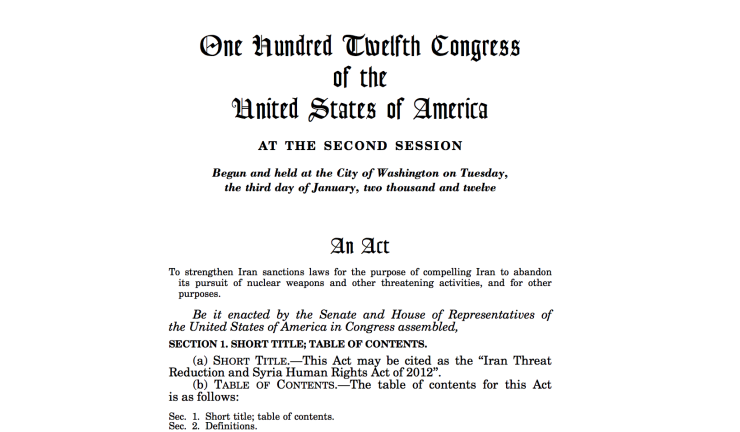The Beauty of TRA Section 504

Can a sanctions provision be so well constructed and creative that in some respects it can be considered… beautiful? It’s a question that only the editor of a site called Sanction Law would be crazy enough to ask. But sometimes a superbly crafted piece of legal writing that produces desired results and is virtually self-enforcing can bring out the poet in even the most jaded sanctions-watcher.
I’m speaking of course about § 504 of the Iran Threat Reduction and Syria Human Rights Act of 2012. Perhaps no other piece of sanctions law better demonstrates the ingenuity of the U.S. Department of the Treasury than TRA 504. While technically contained in a piece of congressional sanctions legislation, during his last hearing on Capitol Hill then-Undersecretary for Terrorism and Financial Intelligence David Cohen appeared to let it slip that § 504 was indeed a Treasury creation.
What is § 504 and why is it haiku-worthy?
§ 504 amends § 1245 of the 2012 National Defense Authorization Act for Fiscal Year 2012 (“2012 NDAA”). Pursuant to § 1245(d), the President is mandated to impose correspondent accounts sanctions on foreign financial institutions that conduct significant financial transactions with the Central Bank of Iran or designated Iranian financial institutions for the sale or purchase of Iranian petroleum or petroleum products. § 1245(d)(4)(D) provides an exception for foreign financial institutions located in jurisdictions that have significantly reduced their imports of Iranian crude oil during the preceding 180-day period. Executive Order 13622 expanded the parties covered by the prohibitions to include the National Iranian Oil Company (“NIOC”) and Naftiran Intertrade Company (“NICO”).
During the period covered by the Joint Plan of Action, six countries have received significant reduction exceptions pursuant to § 1245(d)(4)(D): Japan, China, South Korea, Taiwan, India, and Turkey. § 504 builds on this by adding a restriction on what foreign financial institutions can do with funds due to Iran in exchange for its oil.
(a) IN GENERAL.—Section 1245 of the National Defense
Authorization Act for Fiscal Year 2012 (22 U.S.C. 8513a), as
amended by section 503, is further amended—
…
‘‘(ii) FINANCIAL TRANSACTIONS DESCRIBED.—A
financial transaction conducted or facilitated by a foreign
financial institution is described in this clause
if—
‘‘(I) the financial transaction is only for trade
in goods or services between the country with primary
jurisdiction over the foreign financial institution
and Iran; and
‘‘(II) any funds owed to Iran as a result of
such trade are credited to an account located in
the country with primary jurisdiction over the foreign
financial institution.’’;
This means is that any payments due to Iran must be held in escrow in one of the above-mentioned countries and only used for a) bilateral trade with between Iran and companies in the importing country or b) humanitarian trade. For a more in-depth explanation, OFAC has published a series of helpful FAQs on its website.
The impact of § 504 is due to the fact that even for a major exporter such as China, there are simply not enough goods for Iran to import to offset the amount of money deposited into these accounts. The result is that billions of dollars worth of oil proceeds, which the Iranian government uses to fund its imports, have accumulated in these accounts, unable to be used.
What makes § 504 such a thing of beauty is that it is virtually self-enforcing. Because Iranian oil money can only be used for bilateral trade, the six importing nations were gift-wrapped a captive market for its exporters. Why risk incurring the wrath of Treasury by helping Iran bust sanctions when your companies are profiting substantially from this particular measure? In India, UCO bank, which handles Iranian oil funds, has experienced a complete turnaround since § 504 was put in place, with its Chairman remarking “We had become a marginal player in the banking industry, we are coming back now.”
Even if it meant incrementally reducing purchases of Iranian oil, the risk of violating § 504 was not worth the reward of complying. This is particularly true during the JPOA period, as the U.S. is no longer requiring reductions at all.
In some respects, TRA 504 was a harbinger for some of the measures put in place as part of the Ukraine sanctions program. Rather than simply cutting off certain sectors of the Russian economy wholesale or solely relying on designations, Treasury implement sanctions that target specific types of transactions such as dealing in new debt or the extension of loans with certain maturity dates to identified entities. As one sanctions expert we know likes to say, we used to practice undergraduate-level sanctions, we’re now operating at a post-grad level. The imposition of § 504 was a key moment in that evolution.


